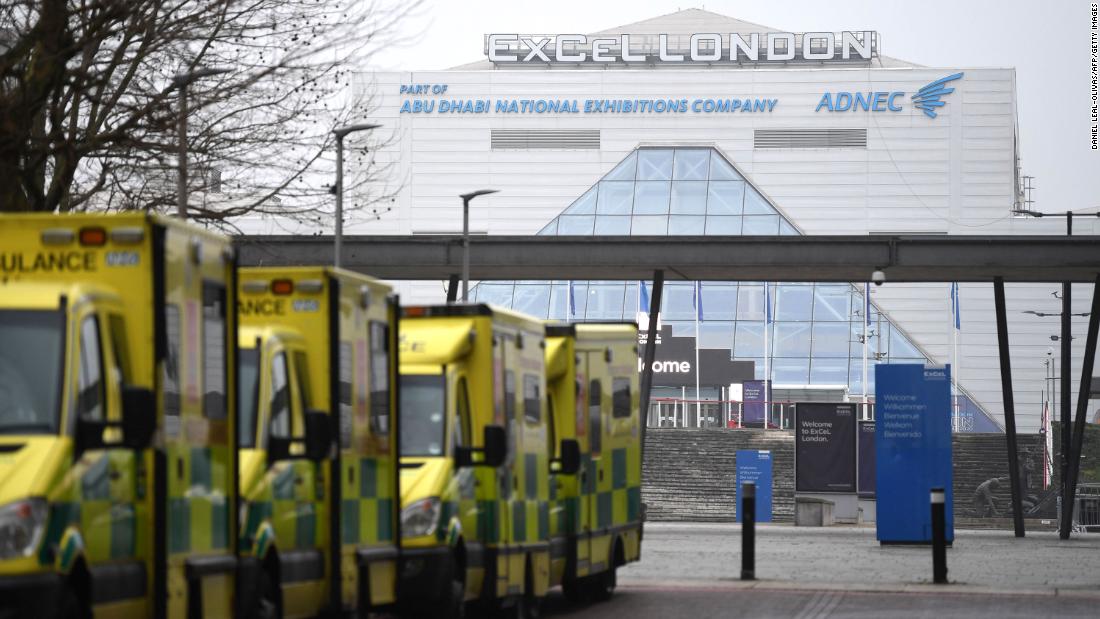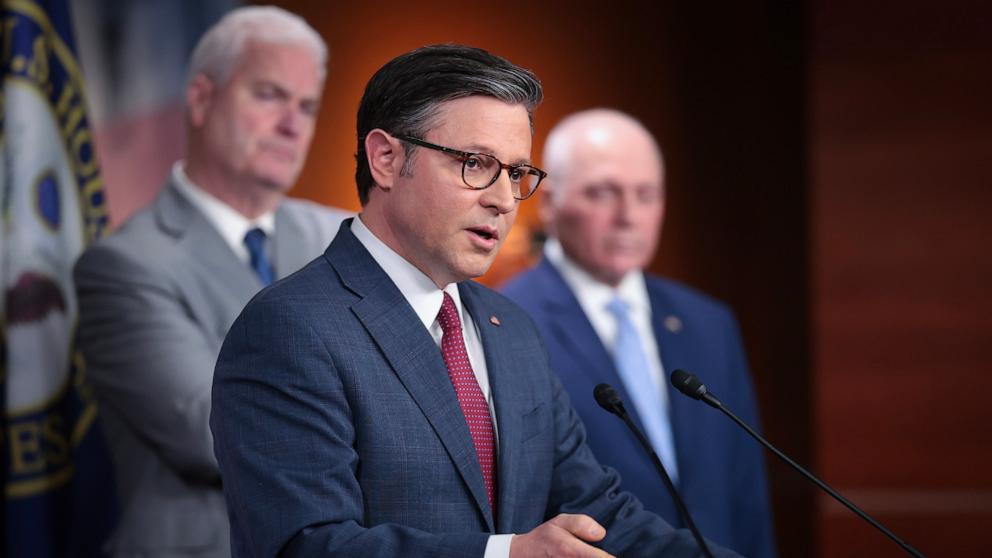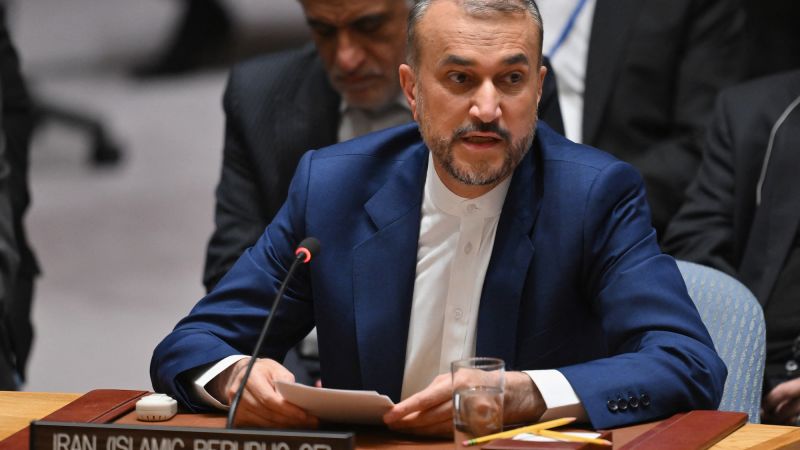A spokesperson for the National Health Service (NHS) told CNN on Saturday that those in charge of field hospitals – which were set up in haste during the first wave of the pandemic but have largely stopped since then – were asked on December 23 to “prepare the services for use.”
The president of the Royal College of Physicians Andrew Goddard said on Saturday that some London hospitals are now filled with nearly two-thirds of COVID-19 patients.
His warning came as the United Kingdom recorded its highest daily rise in coronavirus cases since the start of the pandemic, with 57,725 new cases recorded on Saturday and 445 more deaths, according to the government dashboard.
Goddard said in an interview with CNN’s ITV News: “If you look at the data, some hospitals in London at the moment … nearly two-thirds of their available beds are full of Covid patients and that’s just an amazing statistic and it should make us wonder if it’s This will happen across the UK. ”
“There is no doubt that the new alternative is more transmissible and escalating the cases that we have seen in South Wales, London, Essex and the southeast was at a much greater rate than we have seen with previous strains,” added Goddard.
According to the latest government healthcare data on January 1, there were 22,534 coronavirus patients in hospitals across England. That’s up from nearly 19,000 during the April peak.
Doctors have made emotional calls for the public to stay at home and follow government guidelines on social distancing as hospitals and other healthcare services come under severe pressure.
In another message published on Thursday, Pearce said: “The media reports of pressures on the NHS are all true. The situation in London is now much worse than the first wave, and is still deteriorating. It is sad to see long lines of ambulances outside the hospital where I am. Action.”
“Record numbers” for Covid patients
London Mayor Sadiq Khan told CNN that the capital’s hospitals are dealing with “record numbers” of Covid-19 patients as well as the regular increase in winter demand not associated with Covid.
“We now have more Covid patients in London hospitals than at any time during this pandemic, and the National Health Service in London, hospitals in London and our wonderful health workers in London are suffering from stress,” Khan said Thursday.
Khan said he was “concerned” that hospitals would become overcrowded, but added that the NHS had the flexibility to increase capacity, for example by canceling some routine and elective surgeries.
“But the major concern that we have is, if we continue to see an increase in the spread of the virus, it is likely that hospitals will not have the capacity to adapt and this is the source of particular concern because we have not yet reached the usual January – peak Covid.”
Asked if the military could step in to help the new patients, British Defense Secretary Ben Wallace told the Radio Times on Thursday: “Of course we are ready to help with the Nightingales if the critical pressures exceed the current capacity of the NHS.”
He said the military is currently deploying around 5,000 personnel in the Covid-19 response.
Most of England is now under the toughest level of restrictions to try to limit the spread of the virus.
Amidst the deteriorating situation, ministers were forced to backtrack on the decision to reopen some primary schools in London next week, after coming under pressure from local authorities and teaching unions. All schools in London will now switch to distance learning from Monday, when the new term begins, as only marginalized and vulnerable working children are allowed to attend in person.
The change of course came just two days after the UK Ministry of Education announced that nine neighborhoods in London and the City of London will keep primary schools open, while schools in 23 other areas will remain closed. Khan wrote on Twitter on Friday that the government “finally realized its sane mind and turned it” on its plan to open schools in some areas.
Vaccine deployment plan
More than half a million doses of the Oxford / AstraZeneca vaccine will be available as of Monday, according to British Health Secretary Matt Hancock, and millions more will follow in the coming weeks.
The Palestinian News Agency reported that batches of the Oxford / AstraZeneca vaccine began arriving on Saturday at hospitals in England. Among the first to receive the payment was Princess Royal Hospital in Haywards Heath, West Sussex.
Dr George Findlay, chief medical officer and executive vice president of NHS Trust, University of Brighton and Sussex Hospitals, said the hospital expects to vaccinate hundreds of people per day starting next week.
The vaccine is cheaper and easier to distribute than Pfizer / BioNTech jab, approved for use in the UK in early December, because it can be kept at normal refrigerator temperatures for at least six months.
The new strategy means that the interval between doses can be extended up to 12 weeks, instead of the three weeks previously prescribed. However, Pfizer said it does not have data to show that just one dose of its vaccine will provide protection from the disease after more than 21 days.
The UK Vice Chair of the Joint Committee on Vaccination and Immunization, Anthony Harenden, defended the dosing strategy in an interview with the BBC on Saturday.
“We are not saying that you should not take a second dose. We are saying that the second dose can be temporarily delayed in order to vaccinate more people,” Harden said. “We are in a difficult situation in this country at the moment, and the virus is spreading rapidly and the more vaccines we can introduce into these priority groups, we can prevent more deaths and hospitalizations.”
Regulators in the UK have also advised that the second dose of the newly approved Oxford / AstraZeneca be given after four to 12 weeks.
The new alternative is more popular in less than 20 years
Even if the government achieves its goal of rapidly vaccinating millions of elderly and clinically-at-risk people, thus limiting hospitalizations linked to Covid, the UK faces some tough weeks ahead.
“It’s a very bleak and sad picture at the moment” in England, Deputy Chief Medical Officer Jonathan Van Tam told a news conference in Downing Street on Wednesday.
“The NHS has almost certainly not yet seen the effect of the contagion that will occur during promiscuity at Christmas and this is unfortunately somewhat realistic.”
As of January 1, at least 30 countries, including the United States, have reported cases of the most contagious type of coronavirus that was first detected in the United Kingdom.
A study by a collaborative team from Imperial College London, the University of Edinburgh, Public Health England and others confirmed that the variant had greater transmissibility and was more prevalent in people under the age of 20.
While the study, released on Thursday, found that people under the age of 20 make up a greater proportion of cases of the new variant of the virus, its authors said it was too early to determine the reasons for this, adding that more research is continuing.
There is no evidence that the substitute is more deadly or causes more serious disease, according to health officials.
Sarah Dean, Eleanor Baxton, Sharon Braithwaite and Hera Humayun of CNN contributed to this report.




